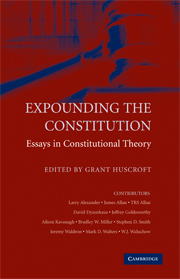Book contents
- Frontmatter
- Contents
- Preface
- Contributors
- Introduction
- PART I MORALITY AND THE ENTERPRISE OF INTERPRETATION
- 1 What Does Constitutional Interpretation Interpret?
- 2 Do Judges Reason Morally?
- 3 Constitutional Morality and Bills of Rights
- 4 Justification and Rights Limitations
- PART II JUDICIAL REVIEW, LEGITIMACY, AND JUSTIFICATION
- PART III WRITTEN AND UNWRITTEN CONSTITUTIONAL PRINCIPLES
- Index
2 - Do Judges Reason Morally?
Published online by Cambridge University Press: 25 July 2009
- Frontmatter
- Contents
- Preface
- Contributors
- Introduction
- PART I MORALITY AND THE ENTERPRISE OF INTERPRETATION
- 1 What Does Constitutional Interpretation Interpret?
- 2 Do Judges Reason Morally?
- 3 Constitutional Morality and Bills of Rights
- 4 Justification and Rights Limitations
- PART II JUDICIAL REVIEW, LEGITIMACY, AND JUSTIFICATION
- PART III WRITTEN AND UNWRITTEN CONSTITUTIONAL PRINCIPLES
- Index
Summary
Legal philosophers have devoted a lot of attention to the following questions: Do judges engage in moral reasoning? Should they engage in moral reasoning? Are they good at moral reasoning? Are they better at moral reasoning than other official decision-makers? Is the quality of their moral reasoning a reason for assigning final decisions about issues of rights to the judiciary rather than to legislatures?
The last couple of questions are particularly important for constitutional jurisprudence. In the debate about judicial review of legislation, it is often suggested that because courts are better at moral reasoning than legislatures are, we should entrust them with final authority over the essentially moral issues of individual and minority rights. Now, this is a quite specific claim about institutional competence, and I suspect it is often put forward on a flimsy basis. We catch a glimpse of what goes on in legislatures, and it sounds like a cacophony. (We ignore Machiavelli's warning not to “consider the noises and the cries that … arise in such tumults more than the good effects that they engender.”) We read a few Supreme Court opinions and they appear to be careful analytic treatments of important issues of rights. Certainly they seem to be talking about the issues in the measured tones and with the articulate arguments that we would expect to use when we discuss them in our seminars and workshops.
- Type
- Chapter
- Information
- Expounding the ConstitutionEssays in Constitutional Theory, pp. 38 - 64Publisher: Cambridge University PressPrint publication year: 2008
- 8
- Cited by



